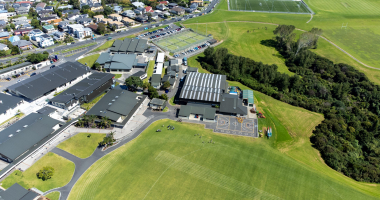Economics – what imagery arises when you hear this word? Men in their Ralph Lauren Purple Label suits trading stocks on Wall Street? Or maybe the Great Depression. Perhaps some old man in a comical top hat and moustache watching over his factory workers.
Contrary to the connotations of Economics, it is more than just finance bros spewing business lingo on a PowerPoint with way too many graphs while wearing their (awesome) Patagonia vests.
What is economics?
Economy has its roots in Greek, derived from the word oikonomos, loosely translating to “one who manages a household”. But why compare a household to the economy? Well surprisingly, households and economies are actually more similar than they are different, in the sense that they face many decisions.
A household has to answer questions like: Who drives the kids to school? Who cooks food? Who does the dirty socks that have been in your room for the last week or so? To answer these questions, a household must allocate its scarce resources (such as time) among its members, taking into account each member’s abilities, efforts, and desires.
Similarly, an economy has many questions to answer: What goods and services should be produced? How do you produce goods and services? Who are goods and services produced for? An economy answers these questions by allocating its factors of production to various jobs before then allocating the goods and services produced. It will determine who drives a Buggati and who takes public transport, or who gets to blow their money on a Stanley Cup and who is left with a reused plastic bottle.
Therefore, it can be concluded that economics is the study of scarcity, particularly how humans allocate scarce resources to best satisfy their unlimited wants. As a whole, economics is broad with several fields and schools of thought. At the college level, economics can be separated into two fields, microeconomics and macroeconomics, both of which are studied with a variety of perspectives; such as Classical, Behavioural, Keynesian and Monetarism.
Why study economics?
Much of economics can be traced back to The Wealth of Nations, written by philosopher and father of modern economics, Adam Smith. In Smith’s book, he made pioneering observations about how capitalism functioned, concluding that individuals, driven by self-interest and guided by the invisible hand (a natural mechanism of resource allocation in a market), unintentionally contribute to greater overall economic benefit through society pursuing personal gain.
But what use are the words of some old Scottish man for a student like you today?
Economics helps you understand the world you live in
I’m sure that over the course of your life thus far, at least a couple of questions relating to economics have sparked your curiosity before. For example, why are living standards so much better in Australia than say, Zambia? Why is housing in New Zealand so expensive? Why did Adrian Orr recently announce that the Official Cash Rate is to remain at 5.5%? These are merely a speck of the multitude of questions that studying economics can help you answer. If you are driven by curiosity and have a thirst for knowledge of how or why the world functions the way it does, economics is perfect for you.
Economics helps you become a more engaged participant within the economy
As you live out the rest of your life, it is inevitable that you will make economic decisions every single day. When you go off to university, you decide how many years you will stay in school for. After you get a job, you decide how much of your disposable income is spent, saved and invested. We could be here for days listing out examples, but what economics can help you with is the development of an analytical approach to how to go about making the best decisions for yourself.
You develop an improved understanding of the potential and the limitations of economic policy
Policymakers, Members of Parliament and world leaders are always tasked with answering economic questions. What happens if the government budget goes into a deficit? What are the effects of participating in free trade?
As these people design policies for whatever country you reside in and you age, you will eventually become eligible to vote (unless you move to some authoritarian state). Therefore, you begin to play a key role in choosing the policies guiding resource allocation in society. Having an understanding of economics will allow you to realise whether a politician proposes a policy that is genuinely effective or if they are just spewing mumbo jumbo at you.
It can be seen that the concepts in economics can be applied in many of life’s situations. Whether you spend the future following the news, running a business, or participating in a debate at Parliament, you will be glad that you studied economics.
What do you learn in economics?
If you have taken commerce at Macleans before, you may have a somewhat rudimentary idea of what exactly economics is. Maybe drawing lines, yet calling them curves, or simply supply and demand, which is fair enough but these courses do not do enough justice to our beloved subject, covering only a small portion of what economics is.
Economics gets rather interesting as you approach NCEA or A Levels. These courses aim to provide you with an idea of the economic issues or influences, the microeconomy (behaviours of households and firms as well as their interrelationships), the macroeconomy (how the economy functions as a whole) and the role of governments.
Here is a snippet of what you will cover in either curricula:
The A Level curriculum includes
- The Basic Economic Problem
- The Price System
- Government Intervention in the Price System
- The Macroeconomy
- Government Macroeconomic Intervention
- International Economic Issues
The NCEA curriculum includes
- Inflation
- Unemployment
- International Trade
- Economic Growth
- Government Policies
- The behaviour of firms (including output and pricing decisions)
- The market (including supply, demand and allocative efficiency)
- Government intervention in the market
- Aggregate economic activity (including government policy to control the economy)
Economics is far from being a distant, abstract concept. Rather, it is a practical tool that can be used by anyone to better understand and engage with what is happening around the world. So why not seize the opportunities offered here at Macleans? Go pick out an economics textbook next time you’re at a library. If you’re a junior perhaps consider studying commerce or economics next year. Or if you’re a senior maybe drop by that Wednesday morning scholarship economics class in K5.
8th March, 2024
Written by Aaron Huang, edited by Amelia Hu
Photo by Chenyu Guan on Unsplash








